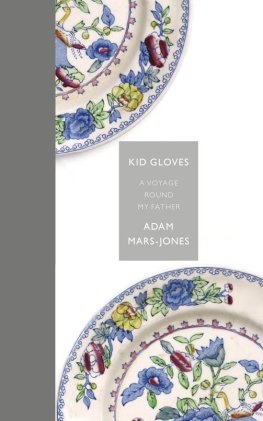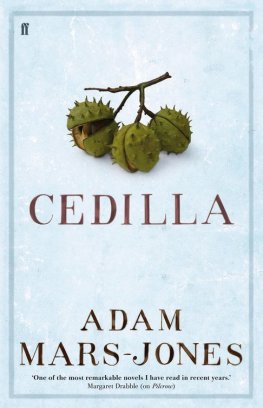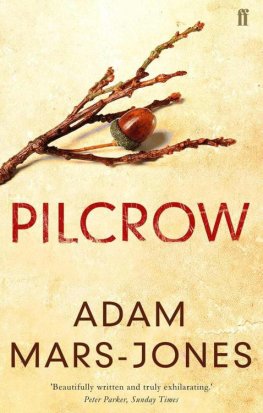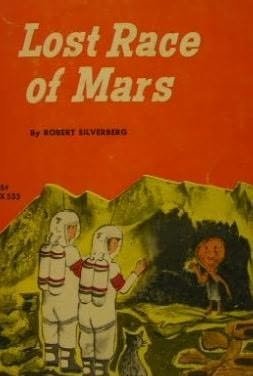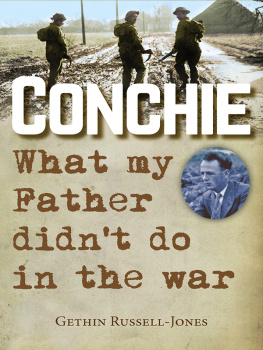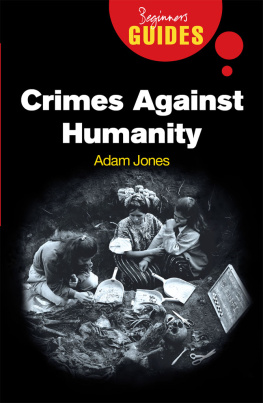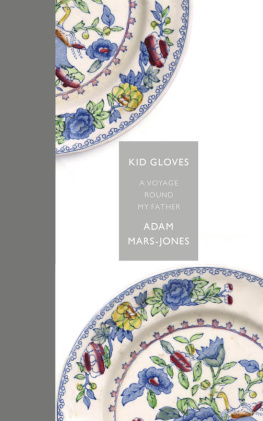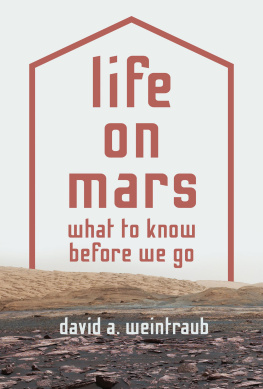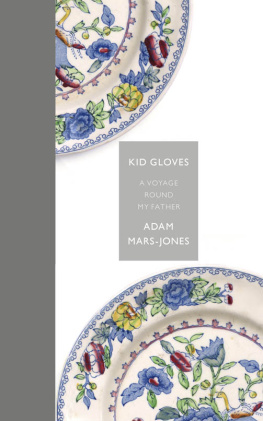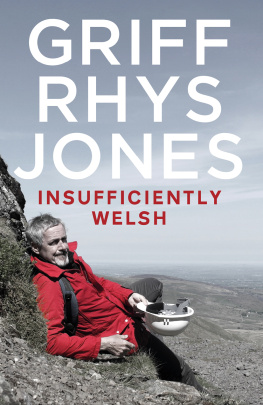Adam Mars-Jones
Kid Gloves: A Voyage Round My Father
For Ebn, Chloe, Holly and Ella
Guy Holborn was kind enough to send me a transcript of the appeal hearing in OSullivan & Another v. Management Agency & Music Ltd & Others. Jill Evans gently pointed out that my ignorance of the law was greater even than I knew.
Parts of this book have appeared in different form in the London Review of Books.
This may be a memoir of my father but I didnt set out to write one, more of an account of a particular time, though necessarily having shreds and slabs of the man scattered across it. I informally moved in with my parents while my mother was dying of lung cancer, something she did with self-effacing briskness in little more than a month. After she was dead, in January 1998, it made sense for me to stay in place to look after the survivor.
My father had been casually described by medical authority as demented, though not officially diagnosed. He was likely to lose his bearings if he had to adjust to a new environment. In fact this was never really something I considered. As an under-employed freelance I had time to spare. Dad had a good pension and his rent for a large flat in Grays Inn Square was low, thanks to the oligarchic machinery of the Ancient and Honourable Society of Grays Inn. As a retired High Court judge, ex-Treasurer and bencher his status in its rankings was high. There was money to pay for a certain amount of care, so that I could continue to be present from Tuesday to Friday at the school gates in Dulwich Village when my daughter Holly, six, finished her proto-academic day.
I didnt feel I had a duty to look after Dad, or if I did I preferred to hide it behind a more libertarian formula. I had a right to look after him. I had first dibs, I could play bagsie. It wasnt that I was bounden, merely entitled. My brothers might play a part, but Tim (the older) lived in Gloucestershire and was tied to Dad mainly by the bonds of rejection a phrase I found in Richard Sennetts book Authority and tried to persuade Tim was a productive way of describing his experience. Matthew (the younger), though based in North London, had a fuller workload than I did. I was free to look after Dad and no-one could override my claim. If I was going to end up doing it anyway, it was sensible to surround myself with the most selfish possible arguments. Then I could never make out I had somehow been railroaded into filial duty.
Dads mental state seemed, to us laymen, closer to withdrawal than any lamentable state of confusion, delusion, vacancy. He could follow conversations without taking an active part, in the time-honoured, head-swivelling fashion of the tennis spectator, happy to watch the interplay with no presumptuous thought of raising a racket himself.
There had been a time when he would smash back everything that came over the net towards him, but he must have forgotten it. Dad had retired as a judge at seventy-five, and in the five years-plus since then he had done nothing remotely active, unless you count listening to Rachmaninovs symphonies. He was a half-serious Celtic fundamentalist who would adopt anyone or anything he admired into the ranks of the faithful, and even lugubrious Rachmaninov (described by Stravinsky as a six-and-a-half-foot scowl, and hardly an obvious candidate for recruitment to the ranks of undersized charmers) could be made over as an honorary Welshman.
Dad wasnt professionally Welsh, if that means any sort of caricature, but he was serious about his Welshness. His English intonation was standard, perhaps modelled on the radio voices he heard in his childhood, before regionalism was a virtue rather than an obstacle to progress. Its true that he deviated from the received pronunciation to say sandwich as sangwidge, making it sound like language, but that was his only deformation of spoken English. When he spoke Welsh, though, there was an extra vitality detectable, almost a roguishness, as if the character that expressed itself in his first language was less thoroughly moralized than the public figure and even the family man.
Welsh people were better or maybe they just had better names. Osian Ellis the harpist. Caradoc Evans the writer. William Mathias the composer. Clough Williams-Ellis the architect of Portmeirion. Kyffin Williams the painter (rhymes with Puffin). Every sound was firmly enunciated by Welsh speakers, taken care of at both ends, launched and landed.
Welsh tongues held on to every part of the word, even in the case of a straightforward place name like Bangor, separating the syllables but somehow leaving the g on both sides of the chasm, rolling the final r. Welsh speakers didnt positively give it two stressed syllables, they just couldnt bear to cheat either part of the emphasis that was its birthright. It was as if the natives, unable to defeat the saesneg invader on his own appropriated turf, him with his second homes and his gleaming Range Rovers, became interior emigrants, finding a refuge in the living rock of the language, and clung to every craggy inch.
Even when speaking English Welsh speakers pronounced words lingeringly. Dad remembered a preacher from his youth whose version of the word phenomenon was like a four-gun salute. A cow in a field, he said, is not a phe-no-men-on, and nor is the moon in the sky. But when the cow jumps over the moon that is a phe-no-men-on.
In retirement Dad could seem vague because his attention tended to be de-centred. His hearing was very acute, and even his vision (despite alleged macular degeneration) could be disconcertingly sharp, picking out window-cleaners at work on the far side of Grays Inn Square when he wasnt near the window himself.
He might comment on something on the radio that no-one else was listening to, which could give an impression of disconnection. A couple of years earlier, when he had been mildly feverish with a kidney infection, I had slept in his room for a couple of nights so as to help with the management of the pee bottle in the long watches of the night. Once I was drifting off to sleep, with the World Service dimly on the radio in the background. The programme was about mountain climbing. I was woken by his voice softly calling out to me. Adam?
Yes Dad, what is it?
Have you ever worn crampons?
If I hadnt made the connection with what was on the radio, I would have thought he was away with the fairies, not up on the peaks with the alpinists of the airwaves.
It hadnt even seemed certain that hed be able to take in the fact of Mums death. His routine the morning after she had died was standard, with a carer arranged by the council helping him along the corridor to the bathroom, but from that moment on the days routine would be taken apart. I had the feeling, hearing the splash of water in the bathroom and the chatty coaxing, that he was being prepared for execution.
I didnt know what I would do if at some point he asked, Wheres Sheila? once hed been told. Would I have to keep on breaking the news, or would it be better to come up with a story about her being out shopping away on holiday, even and hope he wouldnt ask again?
In fact, once he was installed in his bedroom chair and the carer had left, he took in the information fully and cleanly. He said, Oh God, but then after a deep intake of breath turned the exclamation into the beginning of a hymn, singing, Our help in ages past, our hope in years to come. He wept and I held his hand. He never lost sight of the fact of her death, never deluded himself. When, weeks later, I apologized for the fact that he had been given no warning, he seemed surprised, as if it was the most natural thing in the world for his wife of fifty years to slip away without a word.
Sheila had said that she didnt want him to know what was happening. I had just finished telling her that her dying belonged to her and that she shouldnt consider anyone elses wishes, so I could hardly overrule this decision even though I disagreed with it. She said that she could cope with everything except the thought of his life without her, and so we kept him in the dark.

